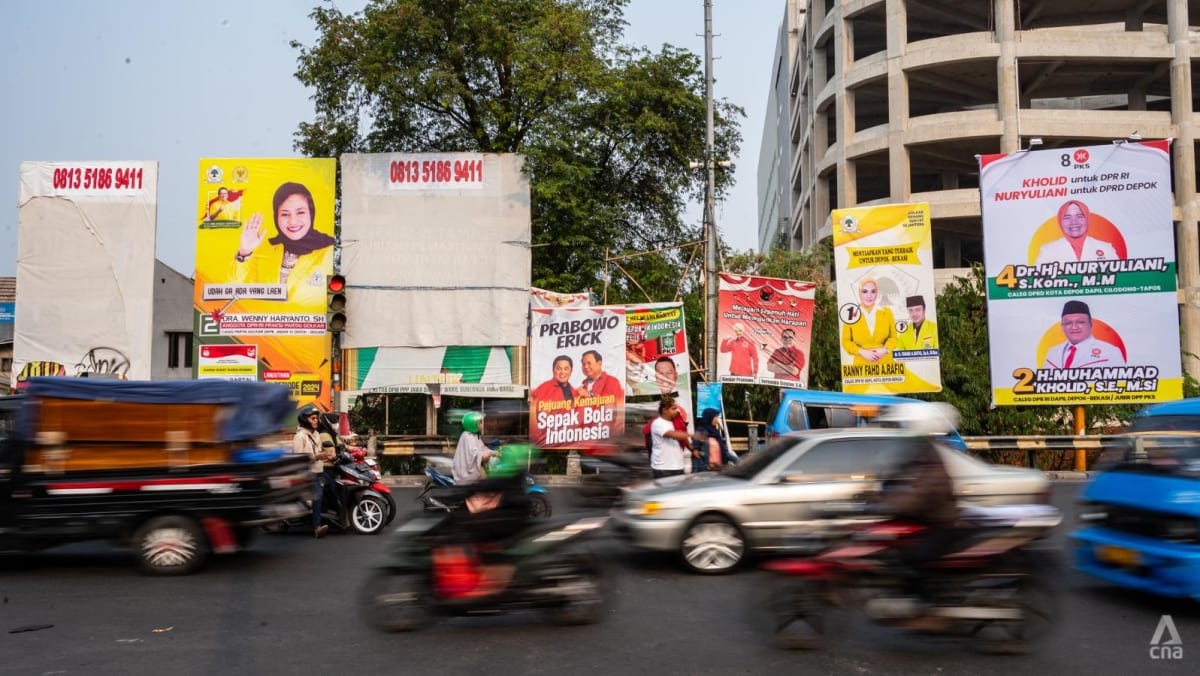JAKARTA: From hectic metropolitan cities to placid rural areas, nearly every corner of Indonesia has for months been crowded by billboards, banners and posters bearing the image of presidential and parliamentary member candidates, and their number seems to be growing as the Feb 14 general elections draw near.
Many of the candidates featured are seasoned politicians who have served as members of parliament (MP) for a number of terms like Mdm Eva Kusuma Sundari, former regional leaders like Mr Dedi Mulyadi or children of politically renowned parents like Mdm Siti Hediati Haryadi, the daughter of Indonesia’s second president Suharto, who ruled the country with an iron fist for three decades.
But in the eyes of many Indonesians, there is something amiss with the campaign materials supporting these three politicians.
Mdm Sundari, 58, was for nearly two decades a member of the Indonesian Democratic Party of Struggle (PDI-P) yet for next year’s election she is running under the National Democratic Party (Nasdem).
As for Mr Mulyadi, the 52-year-old was for 24 years a member of Golkar Party before making the move to the Great Indonesia Movement Party (Gerindra) this year.
Meanwhile, 64-year-old Mdm Haryadi, better known as Titiek Suharto, has a more tortuous political journey. She was first a member of Golkar, which was established by her father; before joining Berkarya, a party formed by her brother Hutomo Mandala Putra, better known as Tommy Suharto, in 2018.
This year, she switched parties again by running for an MP post under Gerindra, a party founded by her ex-husband: defence minister and three-time presidential candidate, Mr Prabowo Subianto.
Related:
A closer look at the three candidates and their running mates contesting Indonesia's Feb 14 presidential election
Indonesia kicks off election season today to pick new president, legislators next February – here's what to expect
Party hopping is so common in the world’s third-largest democracy that Indonesians have devised a derogatory term for politicians engaging in such practice: “Kutu loncat” (jumping lice), suggesting that these people have a habit of sucking the life out of one host before moving on to another.
The issue is once again the talk of the town when Mr Gibran Rakabuming Raka, a member of the PDI-P and the son of the current president Joko Widodo, went on to become Mr Subianto’s running mate even though his party is supporting another candidate: former Central Java governor, Mr Ganjar Pranowo.
Mr Raka’s nomination has fueled speculation that himself and his father, who is also a PDI-P member, will eventually jump ship and move to another party.
Motivations for leaving a party can range from internal squabbles to the party’s declining popularity. But at the heart of it all, Mdm Siti Zuhro, a senior political researcher at Indonesia’s National Research and Innovation Agency (BRIN), said is the opaque nature of how political parties in the country operate.
“Political parties are supposed to be the window into how our democracy functions but the mechanisms inside political parties are far from democratic,” she told CNA.
Mdm Zuhro said there is little transparency and meritocracy in how candidates for parliamentary or executive positions are selected and vetted within a political party.
Related:
Commentary: Politics is a family business in Indonesia – again
“Political parties often disregard a candidates’ competence, experience or even loyalty. In the end, it’s all about popularity, connection and money. Which is why we are seeing so many celebrities as well as spouses, siblings or children of a party elite being selected as legislative or executive candidates,” she said referring to candidates for national and regional executive positions like president, governors and mayors.
A total of 18 parties have qualified to participate in the upcoming presidential and legislative elections and Mdm Zuhro said there are little ideological differences between them.
“Indonesia is not like Australia or the United States where each party has clear ideological platforms, which is why party hopping is rare in the two countries,” she said.
INTERNAL CONFLICTS ABOUND
Party-hopping has been around for decades in Indonesia, analysts noted, affecting not only low-ranking members but also the political elites.
Indonesia’s fifth president, Mdm Megawati Sukarnoputri, was once the chairwoman of the now-defunct Indonesian Democratic Party (PDI) until she was ousted in 1996 in a controversial takeover by a pro-Suharto faction inside the party.
Following the fall of Suharto in 1998, Mdm Megawati formed the PDI-P, adding the word “struggle” to distinguish itself from the Suharto-backed PDI.
Schisms inside Suharto’s Golkar also occurred in the years following the former strongman’s downfall. Former Golkar elites have gone on to found seven political parties including People’s Consciousness Party (Hanura) in 2006, Gerindra in 2008, Nasdem in 2011 and Berkarya in 2018.
In recent years, internal conflicts inside the Prosperous Justice Party (PKS) and the National Mandate Party (PAN) have paved the way for the formation of the Indonesian People’s Wave Party (Gelora) in 2019 and the Ummat Party in 2021 respectively.
Gelora and Ummat will be participating in their first-ever elections next year.
Mdm Zuhro of BRIN noted that these schisms have been spearheaded by two types of party elites: old guards ousted by their juniors or those who failed to secure their party’s chairmanship positions. Such schisms, she added, would likely lead to massive exodus by supporters of the splinter factions.
“This shows how parties have poor internal conflict resolution mechanisms,” she said.





